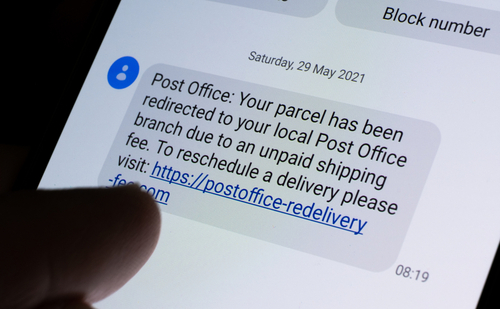There’s something magical about the Christmas period in the UK. Lights go up on Oxford Street, mulled wine appears in every market, and your inbox fills with sales that look too good to miss. But here’s the part you have to look out for—while you’re planning joyful things, scammers are preparing too. And the festive season is their favourite time of year.
At Remitly, many of us have been in your shoes: celebrating Christmas or New Year in a new country, balancing life between two places, and trying to make it all work. But with the rush of shopping, travel plans, and international money transfers, it’s easy to drop your guard for just a second—and that’s when scammers pounce. So, we’ve put together this guide to help you make merry while avoiding common UK festive season scams.
‘Tis the season: the rise of UK festive scams

The National Cyber Security Centre has warned that the Christmas shopping season brings a higher risk of online scams. Between November 2023 and January 2024, UK shoppers lost more than £11.5 million to online scams—an average of £695 per victim. Clothing, high-end tech products, and even cars were among the items most commonly used to lure victims into fake listings or fraudulent websites, showing just how convincing these scams have become.
Why festive scams are increasing
In general, scammers follow the crowd. With so much shopping, travelling, and sending money online during the festive season, these criminals have found more ways to slip into our feeds, inboxes, and even our DMs. Add a dash of festive chaos—including the last-minute deals, long to-do lists, and the late-night scrolling—and it’s no surprise some of their tricks work.
They also know people are more generous this time of year. When you’re in the spirit of giving, you don’t expect to be deceived. That’s why the Charity Commission warns that fraudsters may try to exploit the surge in charitable giving during the festive season. Scammers tug at heartstrings while trying to get into your wallet, too.
Why do UK festive season scams often target immigrants?
If you’re new to the UK, you’ve probably had a crash course in how things work, from figuring out what a “Royal Mail redelivery card” really means to spotting which travel sites are actually safe. Unfortunately, scammers love to take advantage of newcomers. They create fake websites or messages that look just like the real thing, hoping to catch people who are still getting used to life here.
They’re also aware that a lot of immigrants are incredibly generous with loved ones. You’re sending money home, buying gifts for family, and maybe even booking that long-awaited flight to visit. Scammers see that kindness and try to exploit it, sometimes even using familiar languages or cultural cues to build trust first.
Yes, it’s frustrating, but once you know their tricks, scammers lose their power. Recognising the signs, such as a strange-looking link, unexpected payment requests, or “urgent” offers, is usually all it takes to stop a scam before it starts. Staying alert doesn’t mean being suspicious of everything; it just means you’re one step ahead of the crooks trying to steal your Christmas cheer.
Common festive season scams in the UK

Scammers know that people are more distracted and generous during the Christmas rush, making it easier for them to slip through unnoticed. However, knowing what to look out for is the first step in staying safe.
Phishing scams and fake delivery messages
You’ve probably seen them before, texts that say, “Your parcel is waiting. Pay £1.50 GBP to release it here: [scam link].” It sounds quite harmless, but that one click could lead to scammers stealing your hard earned money or banking information.
If you’re not sure whether a message or offer is real, take a moment to verify. Go directly to the company’s official app or website instead of following the link. That tiny moment of caution can save you a considerable headache later on.
Online shopping scams
Who doesn’t get tempted by a bargain? Between Black Friday and Boxing Day, it’s open season for discounts—and for scammers pretending to offer them. Some create fake websites to impersonate real brands, while others list must-have gifts as a small business on social media with prices that seem a little too generous.
Before you buy:
- Take a quick look at the web address and ensure it starts with “https://” and displays a padlock symbol to minimise risk.
- Before purchasing, take a few minutes to search the seller’s name along with words like “review,” “complaint,” or “scam.” If something feels off, pause and ask a trusted friend for a second opinion before completing the purchase.
Rental and ticket scams
Looking for a country cottage rental for Christmas, or tickets to a New Year’s Eve party? So is everyone else, and scammers know it. They’ll post fake listings for beautiful apartments or sold-out events, take your cash, and vanish.
To stay safe, always book through verified sites or official ticket sellers. Be cautious if someone pressures you to “act fast” or only accepts payments via nontraditional methods. Real businesses won’t rush you like that; they want your trust, not just your money.
Charity scams
Most people tend to be a lot more charitable during this time of year, but sadly, others exploit that goodwill for all the wrong reasons. Fraudsters often pose as charities, complete with convincing logos and emotional stories, to solicit donations that never reach anyone in need.
Before donating, make sure the charity is genuine. You can check its name and registration number on the Charity Register at gov.uk/checkcharity — most organisations with an income over £5,000 must be registered. Look for the Fundraising Badge, which shows the charity is registered with the Fundraising Regulator, and verify it in the Fundraising Regulator’s online directory.
Be cautious when responding to emails or links in messages about donations, and if you’re ever unsure, visit the charity’s official website directly to learn more about how your money will be used. Face-to-face fundraisers should carry a valid licence from their local authority. Never feel pressured to give on the spot—take your time and donate directly through trusted channels.
Romance Scams
The Take Five campaign warns that scammers often exploit loneliness and the desire for connection during the festive season. They may pretend to offer friendship or romance, using emotional manipulation to build trust before stealing money or information.
To stay safe, never send money or share banking details with a romantic partner you haven’t met face-to-face. Be cautious of anyone who moves quickly from friendly chat to personal requests, and talk to a trusted friend if something doesn’t feel right.
How to protect yourself from festive season scams

Staying safe means incorporating a few smart habits into your everyday routine. Think of it as giving yourself a digital safety net that allows you to shop, make bookings, and celebrate the festive season with peace of mind.
Know the red flags
Scams often share the same tell-tale signs, so once you know them, they’ll be easier to spot.
- Impossible prices: If a deal looks unbelievably cheap, it probably is.
- Poor grammar or fuzzy logos: Typos, blurry images, or awkward phrasing on websites and emails are classic warning signs.
- Sense of urgency: Scammers love countdown timers and urgent messages. They push you to act fast before you can think.
- Unfamiliar links: Hover over a link before clicking on it. If it looks odd or doesn’t match the brand’s real website, it’s best to stay away.
If something feels even slightly off, it’s perfectly fine to walk away. A real business won’t pressure you; instead, they’ll want you to feel confident purchasing from them.
What to do if you’ve been scammed
If the worst happens and you realise that you’ve been scammed, take a deep breath first. Know that you’re not alone—that this can happen to anyone, even the savviest shoppers and travellers. What matters most is what you do next.
- Start by contacting your bank right away. They might be able to stop or reverse the payment before it clears.
- Next, report what happened to Action Fraud. This helps authorities track down patterns and warn others.
- Remember to keep any evidence you have, such as emails, messages, or payment receipts. This will make it easier to file a claim or support investigation efforts.
- Finally, update your passwords, especially for your email and banking accounts, and turn on two-factor authentication wherever possible.
- Need more help? For detailed steps and trusted resources, visit Remitly’s UK Scam Recovery Resource Guide to learn what to do next if you’ve been scammed.
Useful tools and resources to stay safe online
Knowledge really is power when it comes to avoiding scams. The UK has plenty of free, trustworthy resources to help you stay safe, spot scams, and get support if something doesn’t feel right.
- Get Safe Online: A starting point packed with down-to-earth advice for browsing, shopping, and banking safely.
- Action Fraud: The UK’s national fraud and cybercrime reporting centre.
- Citizens Advice: Offers free, confidential guidance if you’ve been targeted or aren’t sure what to do next.
Stay safe, stay cheerful
The festive season is meant for joy, not worry. By staying alert and taking a few simple precautions, you can protect your hard-earned money from UK festive season scams and focus on what really matters: celebrating, connecting, and giving.
FAQs
What should I do if I get a suspicious message or email?
Delete it immediately and never click on links or attachments. Check the National Cyber Security Centre’s phishing guide for more information on what to do.
What’s the safest way to send money abroad for Christmas?
Stick with regulated, trusted remittance services like Remitly, which use secure encryption and verification technologies.

